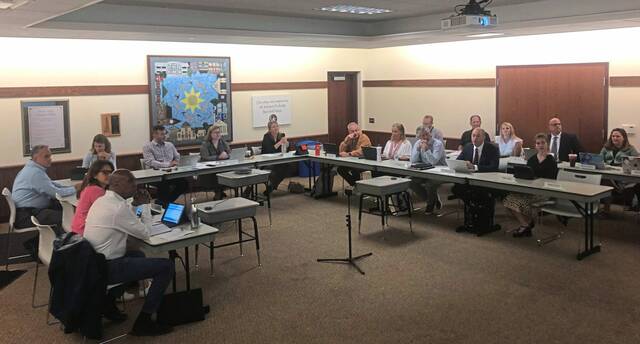https://naviga.triblive.com/local/sewickley/maximum-project-cost-set-for-proposed-quaker-valley-high-school-project-105-million-public-hearing-set/
Maximum project cost set for proposed Quaker Valley High School project: $105 million; public hearing set

Quaker Valley School District officials have announced final financial projections for their proposed new high school.
The board is expected to adopt resolutions this month establishing maximum construction costs of $72.1 million and total project costs at $105 million.
The project would be subject to a voter referendum should it exceed the spending cap, according to district finance director Scott Antoline, who presented a financing plan overview Sept. 12.
“The district is in strong financial position to assume future debt due to balanced budgets, appropriate general fund and capital fund reserves, and timely restructuring and refinancing of current debt,” Antoline said.
The proposed 167,000-square-foot school is on 150 acres of land off Camp Meeting Road. It straddles Leet Township, Edgeworth and Leetsdale.
About 650 students would eventually be enrolled.
New artist renderings were revealed at the Aug. 22 school board meeting.
The financial plan includes borrowing about $94 million via bonds not to exceed 30 years, similar to what was done years ago for the middle and elementary schools.
Tax increases the next five years would be between 3.4% and 2.9%, with 2% of that being annual hikes to just cover operational needs.
District officials said those figures are less than the allowable tax hikes projected under the state’s Act 1 index, a formula that limits real estate tax increases without voters’ approval.
The district also may pull from its capital reserve fund, which is upwards of $4 million.
“We do always talk about the value of Quaker Valley for the tax rate and ‘the QV difference’ that goes along with it,” Antoline said. “It’s a tough balance with taxes. When we ask folks why are they moving into the district, the number one thing they say is, ‘The school.’
“That investment is reflected in the rates and what we do.”
He noted the district refinanced debt from 2014, 2015, 2016 and 2020 to save more than $8 million in debt payments.
State limitations and requirements
Antoline cited several state financial limitations the district must follow.
They included the Act 1 index and the Local Government Unit Debt Act, which limits a school district’s outstanding debt they are allowed to have without voter approval, among the fiscal restrictions being followed.
Quaker Valley must also follow Act 34 — sometimes referred to as the “Taj Mahal Act.”
It requires public hearings on any major construction plans such as new buildings or significant renovations.
The district plans to host such a pubic hearing at 7 p.m. Oct. 26 at the high school, 635 Beaver St. in Leetsdale.
Antoline expressed confidence in the financial plan and how it was crafted with input from a variety of professionals.
The district’s finance team includes PFM Financial Advisors, bond underwriters Janney Montgomery Scott, bond counsel Dinsmore & Shohl and school board treasurer Jeffrey Watters.
The plan is available for review at the distinct office, as well as the district’s website, under the presentations section of the School Board tab.
A video of the presentation will eventually be posted on the district’s YouTube page.
Not buying it
Leet resident William Jasper questioned the district’s financial projections. He claims building costs have been under-reported by about $8 million.
Jasper also claimed the district has not factored in costs for requirements imposed by municipalities, the state or outcome of an appeal of an Allegheny County judge’s ruling regarding Leet’s zoning hearing board.
The township’s board denied the school district’s special exception application for the school in February largely due to plans not showing an emergency access road to and from the property.
The district appealed that decision, and Senior Judge Joseph James removed that roadblock for the district in late November.
It was unclear when Jasper and other Leet residents’ appeal of judge Jame’s ruling would be settled.
“I don’t question your money (and) I don’t question your power, because you have both money and the power,” Jasper said. “I question the wisdom. The selection of that site in Leet was poorly done from a safety standpoint and from a financial standpoint. It’s going to cost more to build there than it would to build at the current high school site.
“The other thing I question is the $72 (million) and the $105 (million aforementioned final financial projections). I think we’re going to find come February, when you get your (project) bids back, that these numbers are not going to hold up.”
School Director Gianni Floro went before his colleagues as a Bell Acres resident during the public comment portion of the meeting and implored the board to remain steadfast in its resolve for the project.
“Many people have put a great deal of time into analyzing all the problems that we face with this project,” Floro said. “The financing, the building itself. We’ve hired a cadre of very competent experts, and then you, unfortunately, have to hear from people who come before you and tell you blatant lies. They don’t tell you where they’re getting their numbers from. We don’t get to see the back of those napkins.”
District officials did not directly address Jasper’s concerns at the meeting.
Antoline said via email the following day that the district considered all its options when crafting the project and its financial plan.
“We are confident in our project estimates that do include inflationary pressures within the construction market as we have hired multiple professionals including a program manager and architectural firm who continually align the project to the budget through every phase of the construction process through conceptual, schematic and design development phases through the bidding documents phase,” he said. “We understand there are several factors that could cause bid numbers to be radically different from estimates, but we have confidence in the diligent professional team we have assembled to design to mitigate such factors and deliver a project within budget.“
Copyright ©2025— Trib Total Media, LLC (TribLIVE.com)
